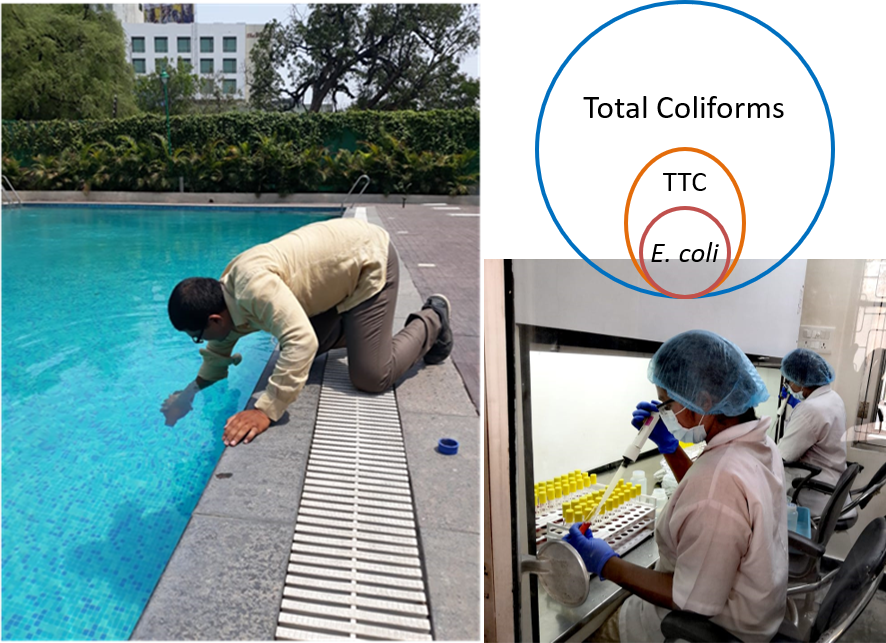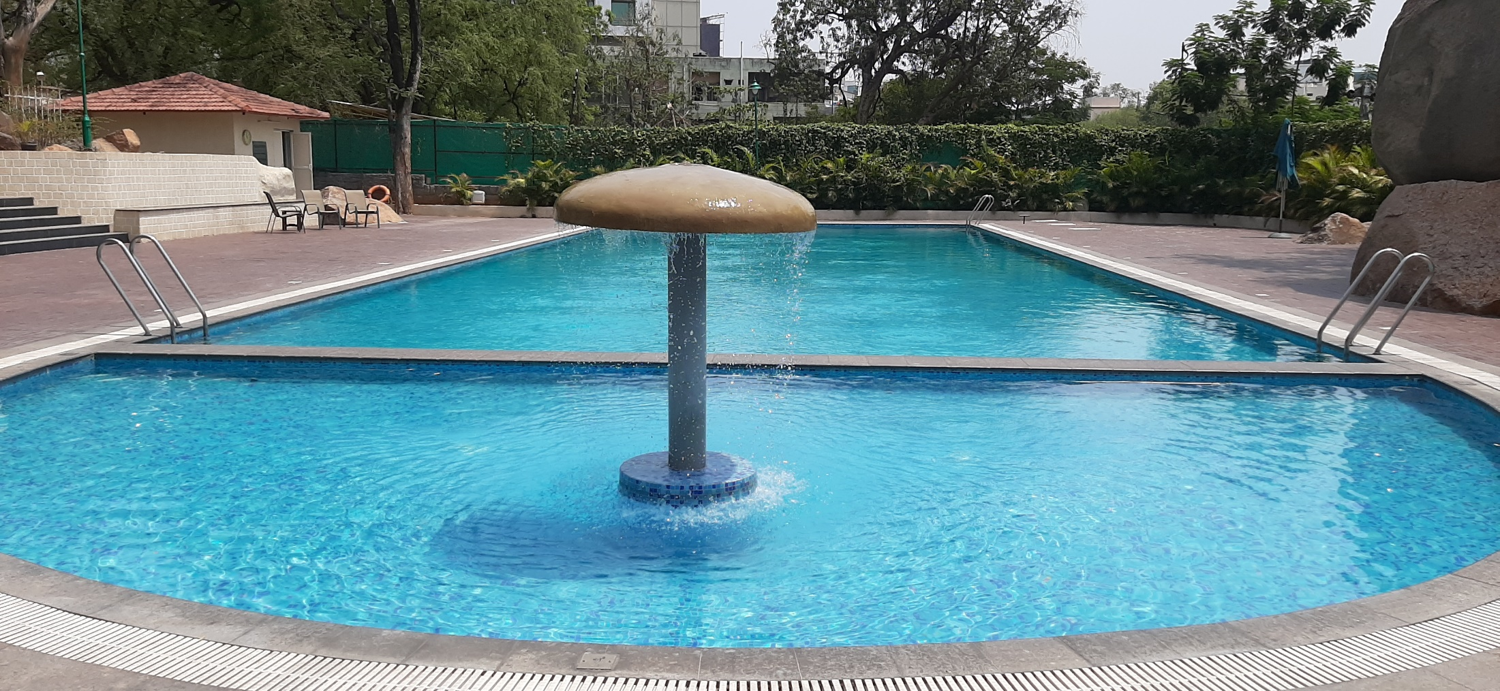Pool Water Bacteriological Analysis for Coliforms (PWB)
Rationale:

Swimming pools are susceptible to contamination. Disease causing organisms may be introduced from many sources but are mainly associated with bathers. These organisms may be brought into pool on bathers’ skin, in their saliva, urine and faeces. Outdoor pools are also vulnerable to contamination from bird droppings. So even if a swimming pool is first filled up with treated and safe water, regular monitoring and treatment is required for continued safety of pool water. Contaminated water can lead to a variety of diseases including diarrhoea, skin, ear and upper respiratory infections, particularly if the swimmers head is submerged or the water swallowed. Bathers can get recreational water illnesses by simply coming in contact and/or swallowing pool water. Breathing in of mists from pool water contaminated with germs can also cause illnesses. Diarrhoea is a common recreational water illness. People typically have about 0.14 grams of poop (similar to a few grains of sand) on their bodies at any given time. When a person who is sick with diarrhoea gets in the water, that tiny amount of poop on their body can wash into the water around them and contaminate it with germs. If someone else swallows the contaminated water, they can become infected. Other recreational water illnesses—such as skin, ear, respiratory, eye, and other infections can be caused by germs that naturally live in the water and soil. If disinfectants like chlorine are not kept at the right level, these germs can multiply and make swimmers sick.
Aesthetically appealing pool water that is looking clear, may be vulnerable, unless the system is designed and operated to disinfect contaminants from bathers. Filling and replenishments with safe water coupled with effective concurrent disinfection is critical for ensuring that pool water is free of faecal contamination through the period of its use by bathers. The control of viruses and bacteria in swimming pool water is usually accomplished by appropriate treatment, including filtration and the proper application of chlorine or other disinfectants. The primary monitoring strategy for contamination free water is frequent testing for concentrations of chlorine (free and combined), along with measurement of pool environment parameters such as pH and temperature, as they affect disinfectant action, and pool water chemistry such as alkalinity and hardness. In addition, bacteriological analysis helps in monitoring the effectiveness of pools water disinfection system and quality assurance for public health. Thermotolerant coliforms (faecal coliforms) and pseudomonas species are primary indicators of contamination from bathers, pets, bird droppings and other animals. Supporting indicators include total coliforms, heterotrophic plate count, and staphylococci.
Scope of this Testing Service:
- 1. Most probable number of total coliforms, MPN (Total coliforms).
- Thermotolerant (Faecal) coliforms and E. coli.

Sample Required:
- Samples can be collected from your swimming pool in Greater Hyderabad Metropolitan (GHMC) area for a small fee. A 50% discount on sample collection service (CSC/GSC) fee, is available if PWB is ordered with pool side tests (PST).
- If you choose to collect your own sample, please read detailed Swimming Pool – Water Sample Collection Guide, copy of which can be downloaded from: https://www.ihs.org.in/lab/wqt/pdf/IHSLabSwPoolSampleCollectionGuide.pdf
- Samples of microbial tests should be taken around the skimmers to maximise the chance of detection. Avoid areas near inlet jets and dead zones like a corner, or steps.
- Use a wide mouth 250ml bottle for Pool Water Bacterial analysis (PWB), which should be clean, dry and sterile, containing sodium thiosulfate - a chlorine neutraliser. As swimming pools tend to have more than usual chlorine, the amount of sodium thiosulfate should be a little more, say double of what is added for sampling of municipal waters. The bottle should be provided with a dark coloured carry bag and ice packs.
- Do not rinse the bottle. Rinsing removes sodium thiosulfate. Keep it closed until ready.
- Hold the bottle near the base and remove the cap from the bottle taking care not to touch the inside of the cap or mouth of the bottle. Be careful to protect the sterile cap and the bottle neck from contamination.
- In the preferred zone for microbial sample, find a clear spot to draw sample. If no such spot is available, create a clear zone by carefully placing bottom of sample bottle on water surface and moving it in a cyclical to motion to disperse floating debris, if any.
- Plunge the mouth of the bottle under the water surface, angled slightly downward, being careful not to let the inner content (sodium thiosulfate liquid or powder) fall out. Fill by turning neck slightly upward and moving bottle slowly forward until filled.
- Lift the bottle up while keeping it away from touching anything. Discard some water so that bottle is filled to the neck. Carefully put the cap back on the bottle and screw it firmly, to avoid any leakage.
- Wipe off water from outside the bottle, wrap it with ice packs and place inside a dark polythene bag. Keep the sample bag away from sunlight.
- Deliver the sample to lab as soon as possible, preferably within six hours, and definitely not later than 24 hrs from time of collection.
Recommended frequency for independent (third party) tests:
Every 4 weeks.
Test Report:
In case of no growth of coliforms, report will be available after 48 hours. If, on the other hand, sample is found to have total coliforms, then additional 48 hours is required to identify absence/presence of thermotolerant coliforms and E. coli.



To pick up sample collection bottle and/or schedule collection of samples: Email: ihslab@ihs.org.in with your address and contact telephone; OR WhatsApp: +919848011251; Or Call: 23211013/4.
